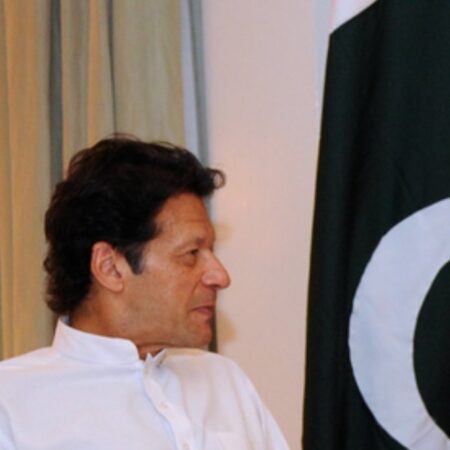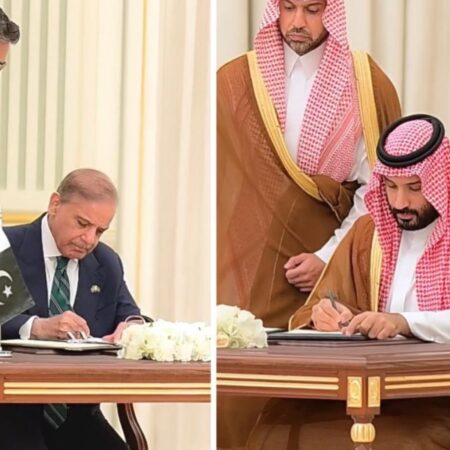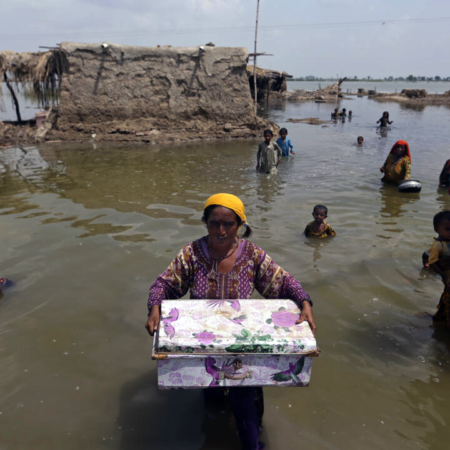According to state media on Wednesday, the Pakistan Air Force (PAF) scrambled its jets, forcing Indian fighter jets patrolling above occupied Kashmir to evacuate, escalating tensions between the two nations following the Pahalgam incident.
Pakistan’s political and military leadership has vehemently denied any participation, while India has suggested cross-border connections of the terrorists without providing any proof. Shehbaz Sharif, the prime minister, has demanded an impartial investigation into the event.
Prime Minister Narendra Modi of India has granted his military “operational freedom” to carry out the Pahalgam attack, while Defense Minister Khawaja Asif has stated that Pakistan has bolstered its forces and is prepared for any Indian incursion. Tensions between the bitter rivals have escalated in recent days.
According to security sources cited by PTV News and Radio Pakistan, four Indian Air Force (IAF) Rafale fighter jets were seen “patrolling overnight” in occupied Kashmir without going across the Line of Control.
“The presence of these Indian warplanes was immediately detected by PAF jets,” Radio Pakistan continued.
According to PTV News, “The Indian Rafale jets panicked and were forced to flee as a result of PAF’s diligent action.” The military was “fully prepared and vigilant to give a befitting response to any aggression from India,” according to the security sources.
Details about the incident have not yet been released by the military or the administration.
This comes after Attaullah Tarar, the minister of information, stated earlier today that “credible intelligence” sources suggested India was preparing to launch a military operation against Pakistan within the “next 24 to 36 hours.”
“Pakistan has credible intelligence that India intends to carry out military action against Pakistan in the next 24-36 hours on the pretext of baseless and concocted allegations of involvement in the Pahalgam incident,” Tarar said in a televised statement released just after two in the morning.
One of the deadliest armed assaults in the disputed Himalayan region since 2000, the April 22 attack claimed the lives of 26 persons, the majority of whom were tourists. Following an initial message claiming credit, Kashmir Resistance, also known as The Resistance Front, stated that it “unequivocally” denied involvement in the incident.
Tarar claimed that Pakistan was utterly “reckless” and strongly opposed the “Indian self-assumed hubristic role of judge, jury, and executioner in the region.”
The minister added, “We have always condemned it in all its forms and manifestations anywhere in the world. Pakistan has truly understood the pain of this scourge, having been the victim of terrorism itself.”
According to Tarar, Pakistan “openheartedly offered a credible, transparent, and independent investigation” by an impartial panel of specialists to determine the truth because it is a responsible state.
“Unfortunately, India has seemingly chosen to follow the perilous path of irrationality and confrontation rather than the path of reason, which will have catastrophic consequences for the entire region and beyond,” he emphasized.
The “evasion of credible investigations is in itself sufficient evidence exposing India’s real motives,” according to the information minister.
“It is regrettable and reprehensible to deliberately subjugate strategic decisions to public sentiments in order to achieve political goals,” he continued.
Tarar reaffirmed that India would face any such military intrigue with confidence and vigor.
“The international community must continue to recognize that India bears the primary responsibility for [an] escalating spiral and its resulting repercussions.”
He reaffirmed the country’s determination to protect Pakistan’s territorial integrity and sovereignty at all costs.
Ishaq Dar, the deputy prime minister, has stated that while Pakistan will not attack India, it retains the right to strike back. Intelligence inputs indicate that India may be considering escalation, he told the Senate yesterday.
According to official reports, the incident today also follows the Pakistan Army’s shooting down of two Indian quadcopters yesterday for violating the nation’s airspace along the Line of Control (LoC) in two different regions of Azad Jammu and Kashmir (AJK).
The first drone was shot down in the Bhimber district’s Manawar sector. The Pakistani military reportedly intercepted and destroyed the drone while it was conducting aerial surveillance. In the Satwal area of Poonch division, the second unmanned aerial vehicle was shot down.
A period of relative calm in the area was broken by the downing of the drones amid ongoing gunfire along the Line of Control in Leepa Valley since the evening of April 25. There were no casualties reported right away.
Meanwhile, shares at the Pakistan Stock Exchange (PSX) saw a significant decline in intraday trading today as worries about a possible breakdown of peace increased.
Indian cyberattack efforts on the websites of a few departments have also been thwarted, according to IT Minister Shaza Fatima Khawaja.
Media and content producers have been cautioned by the National Cyber Emergency Response Team (N-Cert) not to share critical national security information.
Authorities yesterday denied reports of a potential airport closure amid concerns about airspace closures brought on by escalating tensions with India.
An official from the Lahore airport confirmed that flight operations were operating well, and a senior official at Islamabad International Airport stated that the airport was fully operational for both domestic and international flights.
Former PM Imran urges unity and states that peace is his “priority.”
Given the current circumstances, the opposition leader, Imran Khan, the imprisoned former premier, is expected to attend a multi-party convention that the PTI has suggested.
“Peace is our priority, but it should not be mistaken as cowardice,” the former premier told his lawyers yesterday, according to a message posted on Imran’s X account, which is managed by a PTI member.
“We offered to extend all-out cooperation to India, but India failed to produce any concrete evidence,” Imran recalled, referring to the Pulwama-Balakot attacks that occurred during his tenure in 2019.
The former prime minister said, “[…] Modi Sarkar is once again blaming Pakistan instead of reflecting and conducting an investigation.”
Instead of meddling in an area that is already referred to as a “nuclear flashpoint,” he encouraged India to act responsibly.
“As guaranteed by United Nations resolutions, I have consistently emphasized the significance of the Kashmiris’ right to self-determination,” Imran emphasized.
India grants the army “operational freedom” despite requests for moderation.
A senior government official who was not authorized to speak to the media told AFP that Modi gave the military “complete operational freedom to decide on the mode, targets, and timing of our response to the terror attack” yesterday, one week after the Pahalgam attack.
The government made public video footage of a grim-faced Modi meeting behind closed doors with his army and security commanders, including National Security Advisor Ajit Doval and Defense Minister Rajnath Singh.
Modi promised last week to go after those responsible for the attack in Pahalgam, a popular tourist destination, as well as those who encouraged it.
He declared, “I tell the world: India will find, apprehend, and punish all terrorists and those who support them.” “We’ll go to any lengths to find them.”

Indian leaders and others have also increased their calls for military action against Pakistan. According to analysts, they are concerned that aggressive remarks could turn into potential military action.
Friendly nations and international powers have advised India and Pakistan to use moderation and to resolve the issue diplomatically in the face of rising tensions.
Secretary of State Marco Rubio is scheduled to meet with the foreign ministers of India and Pakistan “as early as today or tomorrow,” according to a statement made last night by US State Department spokesperson Tammy Bruce.
According to her, the US is contacting both sides about the Kashmir dispute and is anticipated to advise them not to escalate the situation further.
According to Bruce, Rubio was also urging foreign ministers and leaders from other countries to get in touch over the matter.
US President Donald Trump has given India his “full support” after the Pahalgam incident. Later, he played down regional concerns, claiming that the conflict would be “figured out.”
Saudi Arabia has stated that Riyadh was attempting to “avoid an escalation,” and Iran has already volunteered to mediate. Dar has also briefed the foreign ministers of Türkiye, Azerbaijan, Kuwait, Bahrain, Hungary, the United Arab Emirates, China, and the United Kingdom on Pakistan’s concerns in recent days.
The UN president, Antonio Guterres, yesterday offered “his good offices to support de-escalation efforts,” urging the bitter adversaries to exercise “maximum restraint.”
PM Shehbaz urged the UN chief to advise India to “act responsibly and exercise restraint” during their Tuesday phone conversation.
The biggest assault in occupied Kashmir in recent memory occurred in Pulwama in 2019, when an individual crashed an explosives-laden car into a convoy of security officers, leaving 40 people dead and 35 injured.
Twelve days later, Indian fighter jets conducted airstrikes on Pakistani territory. The Pakistan Air Force launched strikes from Pakistani airspace over the Line of Control the following day.












No Comment! Be the first one.